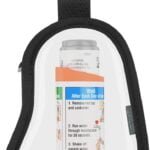
Living with asthma can be a challenge, especially when you find yourself without your trusty inhaler. But fear not, as there are actually several simple yet effective methods to calm your asthma symptoms without needing to rely on an inhaler. Whether it’s practicing breathing exercises, making certain lifestyle changes, or seeking alternative natural remedies, this article will provide you with valuable information and practical tips on how to alleviate your asthma symptoms and enjoy a more peaceful and comfortable life. So, take a deep breath and let’s explore the possibilities together!

Non-Medical Remedies for Asthma Attack Relief
Asthma attacks can be terrifying and overwhelming, but there are several non-medical remedies that can help provide relief during these episodes. One effective technique is deep breathing, which involves taking slow, deep breaths to calm your body and reduce the severity of the attack. By focusing on your breath and taking in more air, you can help relax your airways and alleviate symptoms.
Another technique that can be used during an asthma attack is pursed lip breathing. This involves breathing in slowly through your nose and then exhaling through your mouth with pursed lips, as if you were blowing out a candle. Pursed lip breathing helps create back pressure in your airways, allowing them to stay open and making it easier to breathe.
The Buteyko breathing method is another technique that can be beneficial for asthma sufferers. This method involves consciously reducing the amount of air you breathe in and out, as well as practicing nasal breathing. By breathing less, you can help reduce the chance of hyperventilation, which can trigger or worsen asthma symptoms. This method focuses on improving the efficiency of your breathing, allowing your body to function better and reducing the likelihood of an asthma attack.
Natural Home Remedies for Asthma
In addition to non-medical breathing techniques, there are several natural home remedies that can provide relief for asthma symptoms. One such remedy is ginger. Ginger has been used for centuries as a natural remedy for various respiratory conditions, including asthma. It contains anti-inflammatory properties that can help reduce inflammation in the airways, making it easier to breathe. Ginger can be consumed in various forms, such as brewed as a tea or added to meals as a spice.
Another natural remedy is honey. Honey has long been recognized for its soothing properties and is commonly used to alleviate coughing and throat irritation. For asthma sufferers, honey can help soothe the airways, reduce inflammation, and relieve coughing. It can be consumed directly, added to warm water or tea, or mixed with other ingredients to create a natural remedy.
Coffee is another surprising home remedy for asthma. The caffeine in coffee acts as a bronchodilator, helping to open up the airways and improve breathing. Studies have shown that caffeine can improve lung function for up to four hours after consumption. However, it is important to note that excessive caffeine intake can have negative effects, so it is recommended to consume coffee in moderation and under the guidance of a healthcare professional.
Omega-3 fatty acids, found in foods such as fatty fish, walnuts, and flaxseeds, have been shown to have anti-inflammatory properties that can benefit asthma sufferers. These healthy fats can help reduce inflammation in the airways, improve lung function, and alleviate symptoms. Incorporating omega-3 rich foods into your diet can be a natural and effective way to manage asthma symptoms.

Lifestyle Changes to Manage Asthma Symptoms
In addition to non-medical remedies and natural home remedies, making certain lifestyle changes can help manage asthma symptoms and reduce the frequency of attacks. One important change is to maintain a clean and dust-free environment. Dust mites and other allergens can trigger asthma symptoms, so it is essential to keep your living space clean and free of dust. Regularly vacuuming, dusting, and washing bedding can help minimize exposure to these triggers and improve air quality.
Avoiding triggers is another important aspect of managing asthma symptoms. Everyone’s triggers can be different, but some common ones include pollen, pet dander, smoke, and certain chemicals. By identifying and avoiding your personal triggers, you can help prevent asthma attacks and reduce the severity of symptoms. It may be helpful to keep a journal to track any patterns or triggers that you notice.
Regular exercise and physical activity can also be beneficial for managing asthma symptoms. Engaging in activities that strengthen the respiratory system, such as swimming or cycling, can help improve lung function and reduce the risk of asthma attacks. It is important to consult with your healthcare provider before starting any exercise regimen to ensure it is safe and appropriate for your individual condition.
In conclusion, while inhalers and other medical treatments are essential for managing asthma, there are also non-medical remedies, natural home remedies, and lifestyle changes that can provide additional relief and help reduce the frequency of attacks. By incorporating these techniques and practices into your daily routine, you can take control of your asthma and improve your overall quality of life. Always consult with your healthcare provider before making any significant changes to your asthma management plan.










